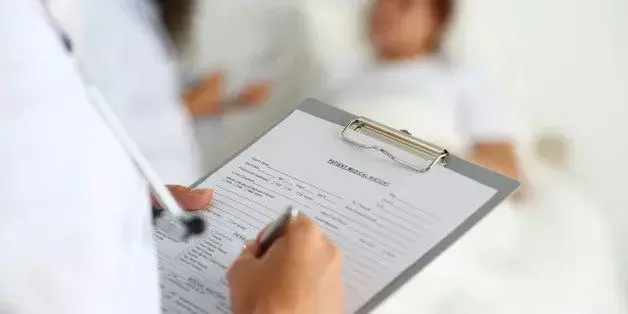- Home
- Medical news & Guidelines
- Anesthesiology
- Cardiology and CTVS
- Critical Care
- Dentistry
- Dermatology
- Diabetes and Endocrinology
- ENT
- Gastroenterology
- Medicine
- Nephrology
- Neurology
- Obstretics-Gynaecology
- Oncology
- Ophthalmology
- Orthopaedics
- Pediatrics-Neonatology
- Psychiatry
- Pulmonology
- Radiology
- Surgery
- Urology
- Laboratory Medicine
- Diet
- Nursing
- Paramedical
- Physiotherapy
- Health news
- Fact Check
- Bone Health Fact Check
- Brain Health Fact Check
- Cancer Related Fact Check
- Child Care Fact Check
- Dental and oral health fact check
- Diabetes and metabolic health fact check
- Diet and Nutrition Fact Check
- Eye and ENT Care Fact Check
- Fitness fact check
- Gut health fact check
- Heart health fact check
- Kidney health fact check
- Medical education fact check
- Men's health fact check
- Respiratory fact check
- Skin and hair care fact check
- Vaccine and Immunization fact check
- Women's health fact check
- AYUSH
- State News
- Andaman and Nicobar Islands
- Andhra Pradesh
- Arunachal Pradesh
- Assam
- Bihar
- Chandigarh
- Chattisgarh
- Dadra and Nagar Haveli
- Daman and Diu
- Delhi
- Goa
- Gujarat
- Haryana
- Himachal Pradesh
- Jammu & Kashmir
- Jharkhand
- Karnataka
- Kerala
- Ladakh
- Lakshadweep
- Madhya Pradesh
- Maharashtra
- Manipur
- Meghalaya
- Mizoram
- Nagaland
- Odisha
- Puducherry
- Punjab
- Rajasthan
- Sikkim
- Tamil Nadu
- Telangana
- Tripura
- Uttar Pradesh
- Uttrakhand
- West Bengal
- Medical Education
- Industry
Include COVID History in Screening Prior to non cardiac Elective Surgeries: JAMA

Many patients with coronavirus disease 2019 (COVID-19) have underlying cardiovascular (CV) disease or develop acute cardiac injury during the illness. In a recent review, experts advised considering the history of COVID-19 illness in addition to the other screenings prior to elective surgeries. They further suggested optimal time for elective surgery in patients who had COVID-19 infection. The review paper was published online in JAMA Surgery on January 12, 2022.
Many COVID-19 survivors are resuming routine clinical care and being referred for elective surgery. However, it is unclear if a history of recent COVID-19 warrants an additional preoperative cardiac assessment. Therefore, Dr Nidhi Rohatgi and her team explored key considerations for cardiac risk assessment in patients with recent COVID-19 undergoing evaluation for elective noncardiac surgery.
The researchers assessed the data of a large international prospective observational study from the GlobalSurg-COVIDSurg collaborative of 140 231 patients undergoing noncardiac surgery, among which 2.2% had a preoperative COVID-19 diagnosis.
They observed that the postoperative incidence of pulmonary complications was greater in patients undergoing surgery within 7 weeks of a COVID-19 diagnosis (7.8%-8.8%), compared with patients in whom surgery was delayed 7 weeks or more after a COVID-19 diagnosis (2.8%) or those without a COVID-19 diagnosis (2.7%).
Therefore, they recommend, "Delaying elective surgery for a minimum of 7 weeks after COVID-19 diagnosis is advised and longer delays may be reasonable in patients with persistent symptoms".
They also recommend preoperative cardiovascular screening for individuals, incorporating the baseline cardiac risk, history of cardiovascular complications of COVID-19, the severity of COVID-19 illness, and the clinical status after recovery, in consultation with CVD specialists.
With regards to asymptomatic patients, they advised, "Asymptomatic patients at low risk of a perioperative major adverse cardiovascular event (MACE) can proceed to noncardiac surgery without additional testing 7 weeks or more after COVID-19 diagnosis".
However, if MACE risk is elevated, they suggested additional testing to further stratify the perioperative risk. These tests may include a 12-lead electrocardiogram, troponin, brain natriuretic peptide, ambulatory monitoring for arrhythmias, transthoracic echocardiogram, or evaluation for cardiac ischemia as indicated, although data to support preoperative testing in this context are limited.
The authors concluded,
- "Standard clinical practice guidelines for perioperative cardiac risk assessment can be generalized to most patients with COVID-19 undergoing noncardiac surgery.
- The severity of COVID-19 illness should be considered in addition to the traditional cardiac risk. Elective surgery should ideally be deferred 7 weeks or more after COVID-19 diagnosis to reduce postoperative mortality.
- Further delay may be advisable in patients with persistent COVID-19 symptoms, but the optimal timing of surgery is unknown.
- Additional preoperative cardiovascular testing may be considered in selected patients, but such evaluation must be individualized in consultation with CVD specialists.
- Ultimately, prospective trials evaluating the optimal approach to preoperative cardiovascular risk stratification after COVID-19 are necessary."
For further information:
Medical Dialogues Bureau consists of a team of passionate medical/scientific writers, led by doctors and healthcare researchers. Our team efforts to bring you updated and timely news about the important happenings of the medical and healthcare sector. Our editorial team can be reached at editorial@medicaldialogues.in.
Dr Kamal Kant Kohli-MBBS, DTCD- a chest specialist with more than 30 years of practice and a flair for writing clinical articles, Dr Kamal Kant Kohli joined Medical Dialogues as a Chief Editor of Medical News. Besides writing articles, as an editor, he proofreads and verifies all the medical content published on Medical Dialogues including those coming from journals, studies,medical conferences,guidelines etc. Email: drkohli@medicaldialogues.in. Contact no. 011-43720751


